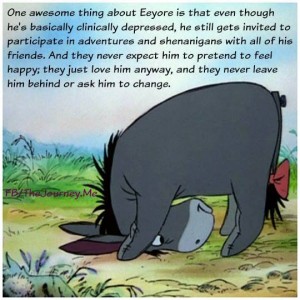I’m sure some of you have seen this meme image. I first saw it on Facebook, via Inspirational Quotes. I like the message of the quote, but I’ll confess that my first reaction was “If only that’s how it was in reality.” Eeyore is an extremely lucky donkey, because his experience is probably the exception.
Usually, the kid with Clinical Depression is ostracized, even shunned, because no one wants to be around a such a gloomy person! Such a child is also a frequent victim of bullying and other forms of abuse. These children are rarely (if ever) invited to adventures or shenanigans. They are always expected to be happy, and are always being left behind! Granted, they are never asked to change. Instead, they are asked to simply stay out of sight. This may sound cruel, but that’s how it often is. The problem is, when you’re talking about tweens and teenagers, that attitude makes some sense. Seriously, who would want to be around the kid who is depressed and grumpy all of the time? How many self-help experts advise staying away from people who make you feel bad?
Believe me, this is something I know about. I’ve been in treatment for clinical depression since my mid-20s, and I suspect I will continue to receive some kind of treatment for the rest of my life.
When someone with clinical depression attempts to socially connect, it’s usually because they are trying to get out of the deep pit they are trapped in. They hope that by latching on to other people, they can be pulled out of their melancholy and enjoy life for a time. Unfortunately, such people are just as likely to drag other people into the darkness with them, rather than be lifted out. A lot of people are unwilling or unable to take that risk, and stay clear of the depressed person. The one type of person who doesn’t avoid the depressed person is another depressed person, which is one of the reasons they tend to pack together. It’s the old adage of “misery enjoys company.” Unfortunately, this doesn’t do any of them any good, because they feed each others depression, and collectively make things worse. I found that for myself, the best thing to do was to isolate myself until the mood passed. Or at least until I had the strength to venture out again.
People sometimes ask me why I abhorred high school so much. Well, see above. Granted, some (but not all) of that isolation was of my own design, so this is not a black and white issue. It’s also much easier to see the patterns, and understand what was going on, when viewed through 30 years of life experience. If you had spoken with me about this topic back in 1985, I would have given you a totally different account.
Clinical depression is a very nasty condition that can hit from a variety of angles, and in ways that are hard to anticipate and impossible to control. Sadly, the first steps to recovery must be done alone, because the recovery has to come from within.
The patient has to decide that first they no longer want to live this way, and second, they need to seek guidance on how to change. This first phase of recovery is very lonely, and very difficult, because no one else can make that first decision. Others may suggest or advise, but the real decision must be made alone, in that dark, cold, featureless room.
It may sound simple, but it isn’t. There is no help at this stage. Help won’t be available until the patient consciously decides to seek it. For some this first step can be easy, especially if they have a few close friends or family available to support them, and a therapist or other type of mentor to help them find a method of treatment what works best for them. For others the first step can be very difficult, because self-esteem is usually in short supply, and the will to continue frequently ebbs. Such people need a good support network to keep going, and without one, they have trouble. Tragically, for some, that first step can be almost impossible, because they can’t see a way out and there is no one who will listen. Such people tend to suffer in silence until a stroke of luck sends someone to ask “what’s wrong.” Or, even more tragically, they opt for the permanent solution of ending their own lives.
Perhaps the most frustrating aspect of clinical depression is that it can’t really be cured. It can only be treated and managed. The black cloud can be kept at bay, but for most it never completely goes away. It’s always there, always waiting for a chance to plunge the patient into darkness again. Like any chronic disease, clinical depression can make even the simplest of days difficult to face.
Don’t let people tell you this disease isn’t real, because it is. If someone tells you that it’s “all in your head,” well, remember this quote from a famous fantasy novel:
― J.K. Rowling, Harry Potter and the Deathly Hallows
And then tell them to do something anatomically impossible.
So Eeyore, you are very lucky, and you are awesome. You have a way to deal with your depression, and you’re using it. You have a group of friends and family to help and support you, even if all they do is keep the doors open, and the lights on. You’re working through it. There are a lot of us who are right there with you, slowly but surely moving forward, battling the monster that is clinical depression, one step at a time.
Keep it up, little guy. Your silent determination to steadily keep moving is an inspiration to many.

